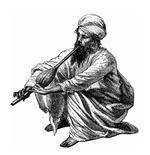
The Qur’an as Allah’s Logos
THE ULTIMATE HERESY
Christianity is rife with complex doctrines and beliefs. As St. Thomas Aquinas said, the truth of the Christian faith “exceeds not only human minds but also those of angels; we believe in them only because they are revealed by God” (De Rationibus Fidei). Oversimplification of the main doctrines of Christianity has resulted in many troublesome heresies, among which Islam may have earned the highest rank.
The vast number of botched attempts to explain one of the central doctrines of Christianity, the Trinity, demonstrates that even many churchmen have a hard time simplifying the great mysteries of the faith. The truth is that on this side of death, our feeble human intellects will repeatedly fall short of understanding things related to the nature of God. This need for humility vis-à-vis the sublime truths of God, however, failed to persuade a seventh-century trader who grew up hearing stories from the Bible but was never properly taught the basic beliefs of Christianity.
Anyone who is familiar with the Qur’an will notice that most of its stories are also found in the Bible, but here and there, characters or the flow of events are altered. It’s as if someone were playing the telephone game, narrating biblical accounts, and Muhammad was the last player, retelling the stories he had heard.
Muhammad was a simple man from a complicated background. He lived in a harsh and unforgiving desert culture. When his first wife, Khadija bint Khuwaylid, suggested that it was the Angel Gabriel who was talking to him during his bouts of delirium, the seeds of a new religion were sown. This new belief system would be much like its founder: simple, carnal, and harsh.
You May Also Enjoy
Texts have a “signature,” or a kind of DNA, that allows us to determine whether a book was written by one or several authors. The Qur’an has traces of at least thirty.
For $333 I would receive “transportation by bus and double occupancy of a tent” on an escorted 60-day ride from Frankfurt, Germany, to Kathmandu, Nepal.
The chief rabbi of Poland said that while "there's not a silence" about the persecution of Christians around the world, "there is not enough yelling and screaming."

